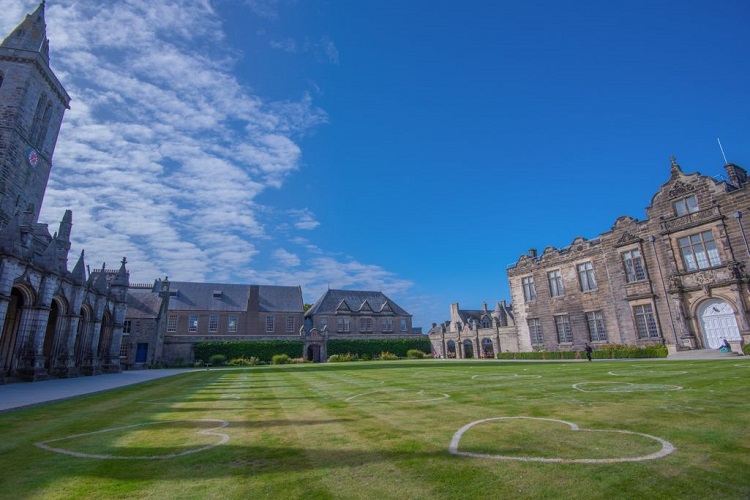Student satisfaction and attainment improve despite pandemic

Students at Scotland’s oldest university have given their lecturers a huge vote of confidence after a study found that teaching satisfaction levels increased during the pandemic, despite the disruption of lockdown and remote learning.
A Teaching and Student Experience Snapshot carried out by the University of St Andrews also confirmed that average grades improved slightly, with anecdotal evidence suggesting that some students may have been able to work harder without the traditional distractions of campus life.
The University carried out the snapshot study to provide assurance on levels of teaching quality and student attainment, and to establish any differences in quality and attainment between in-person teaching, blended learning and remote-only teaching.
Of 22 St Andrews Schools, 21 maintained or significantly improved their student satisfaction scores.
Students studying Classics, Divinity, Economics, Modern Languages, Music, Philosophy, Chemistry, Earth and Environmental Sciences, Geography and Sustainable Development, Maths & Statistics, and Medicine at St Andrews all returned higher teaching satisfaction scores than their predecessors had in previous, pandemic-free, years.
No significant differences in attainment were found between students taught in-person, those who received a blend of in-person and remote teaching, and those taught entirely remotely.
The snapshot looked at St Andrews’ undergraduate and postgraduate entrant cohorts and covered the period from September to December 2020. Satisfaction levels with teaching modules were assessed using an anonymous online questionnaire. The overall satisfaction level was the highest the University has recorded in the last six years.
“While we should treat this snapshot with a degree of caution, this is a remarkable outcome. It reflects well on our staff’s ability to deliver high-quality teaching during the pandemic and on our students’ willingness to appreciate and recognise what is possible under current circumstances,” said Professor Clare Peddie, Vice-Principal (Education).
“Overall, given that all of our students underwent the same assessment regimes within their respective modules, these figures suggest that students who engaged remotely only (and did not benefit from in-person teaching or the facilities provided on campus) performed as successfully as their peers.
“This speaks to the parity of our provision and the quality of our preparations for online teaching, including the provision of learning material through the Library and technical support for the digital delivery of teaching.”
The findings have been welcomed by Dan Marshall, President of the St Andrews Students’ Association.
“Whilst for many students this hasn’t been the year they had hoped for, today’s news is incredibly positive. It is testament to the way in which students and staff have worked hard and pulled together to overcome the challenges of the pandemic and I’m glad that students have recognised staff who have gone above and beyond to support them.”
St Andrews says that while the results give confidence that it can continue to deliver some of its teaching online to very high standards, it is conscious of the “first wave” effect in which teaching and support staff moved heaven and earth and worked round the clock to teach and support students on site in St Andrews alongside a globally dispersed student population. Students meanwhile were inclined to be sympathetic to first term gremlins.
Well above the call of duty, some lecturers set alarms for the middle of the night to deliver remote classes in which most students were in a different continent, others organised socially distanced beach walks to discuss archeology, or held virtual pub quizzes to teach MLitt candidates in Classics.
“Feedback from our Heads of School suggests that the level of staff commitment and engagement witnessed last semester is unlikely to be repeatable,” continued Professor Peddie.
“So many colleagues set personal considerations aside to be there for students in difficult and disrupted circumstances. It would be unrealistic and unfair to expect that activity to continue at the pitch of first semester.
“Students will also, quite rightly, expect a higher level of preparedness than was possible in first semester.
“None of us, our students least of all, would have chosen to have such a disrupted semester and to be teaching and learning in such alien circumstances. Our students have done really very well, but we, and they, have missed the on-campus experience enormously.”
St Andrews is one of a growing number of UK universities to have confirmed that teaching will remain online-only for a majority of students for the remainder of the academic year, given continuing Government restrictions on travel and public life.
It has invested more than £500,000 in a Can Do programme, a joint initiative with the St Andrews Students’ Association, which supports in-person and online extra-curricular and co-curricular student activity within the bounds of public health restrictions.
Issued by the University of St Andrews Communications Office.